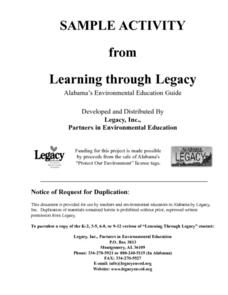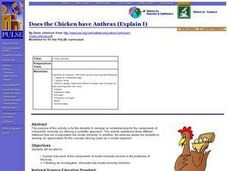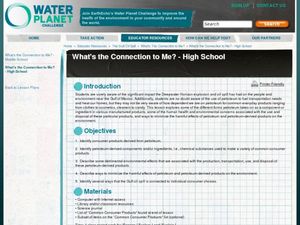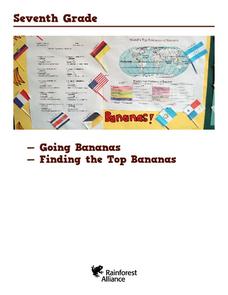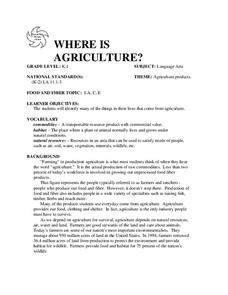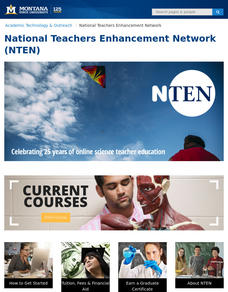Curated OER
Gotta Have Energy
Students explore energy. They discuss the types and uses of energy and research an assigned energy source. They create a "benefits versus potential environmental impacts" chart that lists energy sources and possible impacts. They...
Curated OER
Does the Chicken have Anthrax (Explain I)
Students explain how each of the components of innate immunity function in the protection of the body. Following an investigation, they articulate how innate immunity functions.
Curated OER
Floodplains in the field (with GIS)
Students measure a topographic and geologic cross-section across a floodplain by simple surveying and auguring techniques. They consider the spatial context of the field observations, use GPS measurements, and desktop GIS analyses.
Curated OER
Plant Word Search Puzzle
In this science activity, middle schoolers look for the words that are related to the concept that is reviewed in the sheet. They also acquire new vocabulary.
Curated OER
Mussel Movements
Students consider the impact of invasive species on local environments. In this ecology lesson, watch the video, Arizona Wildlife Views, which focuses on invasive species. Students develop vocabulary, relate to meaningful comprehension...
Curated OER
Layers Upon Layers - Lesson Plan
Students study rock layers and the sequence of events that occur when a canyon forms. In this sedimentary lesson students complete a lab while in groups and discuss what happens.
Curated OER
What's the Connection to Me?
Learners discuss the impact of oil spill to the environment and to their daily lives. In this environmental science lesson, students research the pros and cons of petroleum based products. They share their findings in class.
Curated OER
UMNH: Cultural Clutter - Tales In The Trash
Fourth graders list three or more types of evidence of prehistoric cultures that encouraged archaeologists to investigate the marshes around the Great Salt Lake. They also explain why it is important not to disturb archaeological remains.
Curated OER
Urban Impact on Chollas Creek (California): A Field Study
Students, in groups, take samples from a creek and keep a field journal on their samples. They also perform tests on their samples.
Curated OER
Two Ways About It
Students take an imaginary hike in two opposite directions along a lake. They view and interpret satellite images and discuss the pros and cons of hydroelectric dams.
Curated OER
Honduras: Going Bananas
Young scholars explore the popularity of bananas. They conduct a survey to understand the reasons for their popularity. Students research a banana's journey from the farm to school lunch. They compose a children's book about bananas...
Curated OER
Design and Function of Native Watercraft
Students design clay boats and test their floating ability. They sketch and record each test different boat designs. They compare their designs to those of native Inuit vessels by looking at images and attempting to determine the...
Curated OER
WHERE IS AGRICULTURE?
The students will identify many of the things in their lives that come from agriculture.See if someone involved in production agriculture will "adopt" your class. Students can correspond with the farmer or rancher's family. This will...
Curated OER
Plants Word Search Puzzle
In this science worksheet, middle schoolers look for the words that are related to the concept that is reviewed in the sheet. They also acquire new vocabulary.
Curated OER
Natural Wonders
In this natural wonders worksheet, student unscramble words, using lyrics to a song titled "Natural Wonders." An answer key is included on page 3. No song link is given.
Curated OER
Harmful Effects of Acid Rain
Students participate in an experiment to become aware of the harmful effects of an acidic solution -- acid rain.
Curated OER
Currents: Bad for Divers; Good for Corals
Students describe, compare, and contrast major forces that drive ocean currents. They discuss the general effects of topography on current velocity. They discuss how velocity affects the ability
Curated OER
Trail of Discovery
Students collaborate on a research-based documentation of their town's founding, written from the point of view of a fictional person who lived there long ago
Curated OER
The Effect of Moisture on Soil Temperature
Students analyze the relationship between soil moisture and its effect on soil temperature.
Curated OER
Wolf Pack in a Bottle
Students participate in an activity of a mock electrophoresis using paper chromatography to study DNA and genetic restriction mapping.
Curated OER
Surveying During a Basketball Game
Tenth graders conduct a survey at a high school basketball game. They compile and present the data as histograms or bar graphs.
Curated OER
Native Plant Restoration Project
Students distinguish between exotic and native plant species. They work in groups in the field to restore a natural habitat. A class map is created to reflect their work in the field.
Curated OER
My Favorite Meal
Students investigate ecological systems and the multiple uses of the environment by studying the osprey population.
Curated OER
Making Community Measurements: Which Plant Part?
Students identify a plant in a given community and make a variety of measurements. They determine how a plant meets its basic needs. In addition to identifying plant parts, they observe seasonal change and compare plants within a community.


